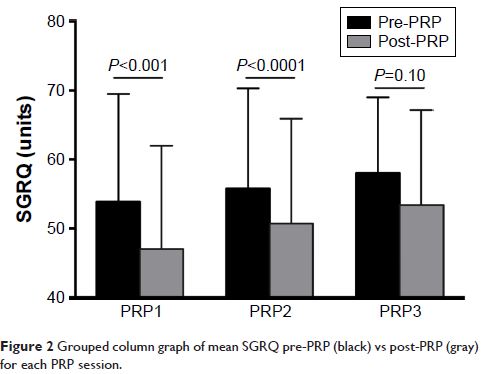109568
论文已发表
注册即可获取德孚的最新动态
IF 收录期刊
- 3.4 Breast Cancer (Dove Med Press)
- 3.2 Clin Epidemiol
- 2.6 Cancer Manag Res
- 2.9 Infect Drug Resist
- 3.7 Clin Interv Aging
- 5.1 Drug Des Dev Ther
- 3.1 Int J Chronic Obstr
- 6.6 Int J Nanomed
- 2.6 Int J Women's Health
- 2.9 Neuropsych Dis Treat
- 2.8 OncoTargets Ther
- 2.0 Patient Prefer Adher
- 2.2 Ther Clin Risk Manag
- 2.5 J Pain Res
- 3.0 Diabet Metab Synd Ob
- 3.2 Psychol Res Behav Ma
- 3.4 Nat Sci Sleep
- 1.8 Pharmgenomics Pers Med
- 2.0 Risk Manag Healthc Policy
- 4.1 J Inflamm Res
- 2.0 Int J Gen Med
- 3.4 J Hepatocell Carcinoma
- 3.0 J Asthma Allergy
- 2.2 Clin Cosmet Investig Dermatol
- 2.4 J Multidiscip Healthc

Magnitude of exercise capacity and quality of life improvement following repeat pulmonary rehabilitation in patients with COPD
Authors Sandoz JS, Roberts MM, Cho JG, Wheatley JR
Received 6 January 2017
Accepted for publication 19 February 2017
Published 6 April 2017 Volume 2017:12 Pages 1085—1091
DOI https://doi.org/10.2147/COPD.S131778
Checked for plagiarism Yes
Review by Single-blind
Peer reviewers approved by Dr Lucy Goodman
Peer reviewer comments 2
Editor who approved publication: Dr Richard Russell
Background: Maintenance and repeated pulmonary rehabilitation programs
(PRPs) for patients with COPD have attempted to prolong PRP benefits beyond
12–24 months. However, there is limited evidence as to the magnitude of benefit
or the ideal interval between repeating the program under “real-world”
conditions in which patients are referred based on clinical necessity.
Therefore, we reviewed the effects of repeating PRP in a physician-referred
cohort of patients with COPD.
Methods: A total of 141 individuals with COPD completed PRP
twice and 35 completed PRP three times over a 12-year period. We used linear
mixed-effects models to quantify the magnitude and change in 6-minute walk
distance (6MWD), St George’s Respiratory Questionnaire (SGRQ), and Hospital
Anxiety and Depression Scale (HADS) for each PRP. One-way analysis of variance
with Tukey’s post hoc analysis compared the effects of different time intervals
on 6MWD, SGRQ, and HADS between PRPs.
Results: Despite 39 mL/year average decrease in forced
expiratory volume in 1 second, overall 6MWD improved following each PRP
(PRP1=58 m, P <0.0001;
PRP2=42 m, P <0.0001; PRP3=32 m, P <0.003). Mean SGRQ decreased
after PRP1 (-7.0 units; P <0.001) and PRP2 (-4.9 units; P <0.0001) but not after PRP3
(-3.2 units; P =0.10). HADS
decreased after PRP1 (-1.9 units; P <0.0001) and
PRP2 (-1.7 units; P =0.0001) but not
after PRP3 (-0.4 units; P =0.63).
Conclusion: In physician-referred patients who underwent repeat
PRP as clinically required, there were clear benefits in functional exercise
capacity following each repeat PRP, which was not affected by the time interval
between PRPs. Health-related quality of life and mood improved after the first
two PRPs, but not after a third.
Keywords: exercise
therapy, chronic obstructive pulmonary disease, quality of life, exercise test
